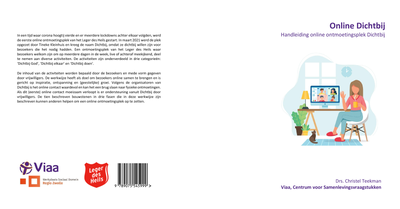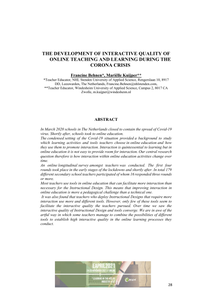Haalbaarheidsonderzoek Communication & Multimedia Design in het kader van het strategisch project Verbreding aanbod informaticaopleidingen.
DOCUMENT

In een tijd waar corona hoogtij vierde en er meerdere lockdowns achter elkaar volgden, werd de eerste online ontmoetingsplek van het Leger des Heils (hierna: LdH) gestart. In maart 2021 werd de plek opgezet door Tineke Kleinhuis en kreeg de naam Dichtbij, omdat ze Dichtbij willen zijn voor bezoekers die het nodig hadden. Een ontmoetingsplek van het LdH waar bezoekers welkom zijn om op meerdere dagen in de week, live of achteraf meekijkend, deel te nemen aan diverse activiteiten. De activiteiten zijn onderverdeeld in drie categorieën: ‘Dichtbij God’, ‘Dichtbij elkaar’ en ‘Dichtbij doen’. De inhoud van de activiteiten worden bepaald door de bezoekers en mede vorm gegeven door vrijwilligers. De werkwijze heeft als doel om bezoekers online samen te brengen en is gericht op inspiratie, ontspanning en (geestelijke) groei. Volgens de organisatoren van Dichtbij is het online contact waardevol en kan het een brug slaan naar fysieke ontmoetingen. Als dit (eerste) online contact moeizaam verloopt is er ondersteuning vanuit Dichtbij door vrijwilligers. De tien beschreven bouwstenen in drie fasen die in deze werkwijze zijn beschreven kunnen anderen helpen om een online ontmoetingsplek op te zetten.
DOCUMENT

For this exploratory study we aim to provide knowledge and insights concerning the processes of setting up, implementing and managing online communities as a part of the product/services offer of media companies. The goal is to increase their reach amongst target groups, to strengthen involvement with their audiences and to entice their audiences to participate. This information should help us to understand the many different aspects important for developing and managing online communities. The research question for this phase is: Which critical success factors play a role in the process of setting up and managing online communities using social media in order to activate and/or engage target audiences? In this exploratory first phase we looked into literature relating to general guidelines and critical success factors in setting up and managing online communities. These aspects include, communication and interaction options, functionalities for sharing information, the content structure given, the importance of socialization within the community, the policies used and the usability of the platform (Ning Shen & Khalifa, 2008).
DOCUMENT

Effective and quality online education requires an instructional design approach that can lead to educational transformation. This approach can be characterized by advanced flexibility, learner autonomy and extensive use of digital technologies to enhance learning outcomes. One of the main challenges of online education, which has been investigated by current researchers in the field, is the physical distance between educators and learners. In this context, synchronous communication, perceived as the direct communication that occurs in real time between learners and educators, has been considered as a way to bridge this distance and improve communication and interaction in teaching and learning.As the field of synchronous communication in online education is ever maturing, this paper attempts to systematically review the literature relevant to technological tools and strategies, which can lead to a productive student experience. The two authors collaborate to apply a qualitative method, coding and synthesizing the results using multiple criteria. The main objective of this systematic literature review is to identify the tools, theories and strategies that online education providers can implement to ensure that synchronous instruction enhances students’ learning outcomes. The research, which was conducted between January and April 2020, used Google Scholar and ProQuest data bases. The reviewed papers were selected with prior chosen keywords: synchronous communication, technological tools for synchronous communication, effective synchronous communication, synchronous communication learning experiences, strategies for synchronous communication, theories for synchronous communication, software for synchronous communication. The term interaction was also used instead of the term communication in the combination of keywords mentioned above. The keywords were combined while operating the Boolean operator “AND”. The selected papers were published in peer-reviewed journals, in English, between 2010 and 2020. The selection process consisted of four phases: Identification round, first round of exclusion, second round of exclusion, and final inclusion round. The identified articles were collected in a shared RefWorks project.On balance, results are divided in two main groups:a) technological tools, which enhance synchronous communication,b) learning theories and strategies, which can contribute to an effective synchronous communication experience.As a final step, the authors consolidate evidence for the benefit of academics and practitioners in online education interested in the efficient use of synchronous communication for pedagogical purposes. Such evidence also provides potential options and pathways for future research.
DOCUMENT
MOOC’s (Massive Open Online Courses) zijn een opkomend fenomeen. In deze whitepaper wordt gekeken naar de mogelijkheid voor inpassing van MOOC’s in het huidig onderwijs. Wat zijn de voor- en nadelen van de online cursussen? Welke kansen biedt het?
DOCUMENT

In this article, the main question is whether and, if so, to what extent online journalism raises new moral issues and, if any, what kind of answers are preferable. Or do questions merely appear new, since they are really old ones in an electronic wrapping, old wine in new bottles? And how does journalism deal with the moral aspects of online journalism? The phenomenon of the Internet emerged in our society a few years ago. Since then, a large number of Dutch people have gone online, and the World Wide Web is now an integral part of our range of means of communication. Dutch journalism is online too, although certainly not in the lead. More and more journalists use the Internet as a source, especially for background information. Newspapers have their web sites, where the online version of the printed paper can be read. And that is it for the time being. There are no more far-reaching developments at present, certainly not on a large scale. Real online journalism is rather scarce in the Netherlands. The debate concerning the moral aspects of online journalism is mainly being conducted in the United States. First of all, by way of introduction, I will present an outline of online journalism. The first instance is the online version of the newspaper. Here, only to a certain degree new issues come up for discussion, since the reputation of reliability and accuracy of the papers, in spite of all criticism, also applies to their online versions. Besides, especially in the United States and increasingly in European countries as well, there is the so-called dotcom journalism, the e-zines, the online news sites without any relationship with printed newspapers. This may be the reason why these sites do not have a strong commitment to moral standards, at least as they have developed in the journalistic culture of the newspapers. After having outlined the moral issues arising in online journalism, the question will be addressed whether and, if so, to what extent it is meaningful and desirable to develop instruments of self-regulation for this new phenomenon of journalism.
DOCUMENT

In March 2020 schools in The Netherlands closed to contain the spread of Covid-19 virus. Shortly after, schools took to online education. The condensed setting of the Covid-19 situation provided a background to study which learning activities and tools teachers choose in online education and how they use them to promote interaction. Interaction is quintessential to learning but in online education it is not easy to provide room for interaction. Our central research question therefore is how interaction within online education activities change over time. An online longitudinal survey amongst teachers was conducted. The first four rounds took place in the early stages of the lockdowns and shortly after. In total 179 different secondary school teachers participated of whom 16 responded three rounds or more. Most teachers use tools in online education that can facilitate more interaction than necessary for the Instructional Design. This means that improving interaction in online education is more a pedagogical challenge than a technical one. It was also found that teachers who deploy Instructional Designs that require more interaction use more and different tools. However, only few of these tools seem to facilitate the interactive quality the teachers pursued. Over time we saw the interactive quality of Instructional Design and tools converge. We are in awe of the artful way in which some teachers manage to combine the possibilities of different tools to establish high interactive quality in the online learning processes they conduct.
DOCUMENT

Objective: To gain insight into how communication vulnerable people and health-care professionals experience the communication in dialogue conversations, and how they adjust their conversation using augmentative and alternative communication (AAC) or other communication strategies. Methods: Communication vulnerable clients and health-care professionals in a long-term care institution were observed during a dialogue conversation (n = 11) and subsequently interviewed (n = 22) about their experiences with the conversation. The clients had various communication difficulties due to different underlying aetiologies, such as acquired brain injury or learning disorder. Results from the observations and interviews were analysed using conventional content analysis. Results: Seven key themes emerged regarding the experiences of clients and professionals: clients blame themselves for miscommunications; the relevance of both parties preparing the conversation; a quiet and familiar environment benefitting communication; giving clients enough time; the importance and complexity of nonverbal communication; the need to tailor communication to the client; prejudices and inexperience regarding AAC. The observations showed that some professionals had difficulties using appropriate communication strategies and all professionals relied mostly on verbal or nonverbal communication strategies. Conclusion: Professionals were aware of the importance of preparation, sufficient time, a suitable environment and considering nonverbal communication in dialogue conversations. However, they struggled with adequate use of communication strategies, such as verbal communication and AAC. There is a lack of knowledge about AAC, and professionals and clients need to be informed about the potential of AAC and how this can help them achieve equal participation in dialogue conversations in addition to other communication strategies.
DOCUMENT

The purpose of the paper is to describe the ways in which people use language to achieve mobilization. Recognizing and anticipating the discursive practices that are used online, for instance for mobilization, increasingly is a primary concern for professionals in crisis communication or issue management. Het doel van dit artikel is het beschrijven van de manieren waarop mensen taal gebruiken om mobilisatie mogelijk te maken. Het herkennen van en anticiperen op discursieve praktijken die online plaatsvinden, bijv. mobilisatie, is in toenemende mate een zorg voor professionals in crisiscommunicatie of issuemanagement
DOCUMENT
Contrary to most sectors, to date the tourism and aviation industries have not managed to level off greenhouse gas emissions. Moreover, effective mitigation through technological innovation or structural and behavioural change cannot be expected shortly. Airlines and tourism companies appear to use carbon offsetting as a last resort. However, offsetting is generally acknowledged as a second-best solution for mitigating emissions, after reducing energy use. This paper seeks to determine the mitigation potential of voluntary carbon offsetting by comparing public and industry awareness of climate change and aviation emissions, and attitudes to various mitigation measures with relevant online communication by 64 offset providers. Methods were a literature review and online content analyses. Overall, the gaps that were identified between awareness, attitude and actual behaviour are not bridged by provider communication. From this perspective, the mitigation potential of voluntary carbon offsetting for achieving reductions of tourism transport emissions is estimated as low. The same conclusion is reached by comparing carbon dioxide volumes of flight offsets with actual air travel emissions. Current sales of flight offsets compensate less than 1% of all aviation emissions.
MULTIFILE